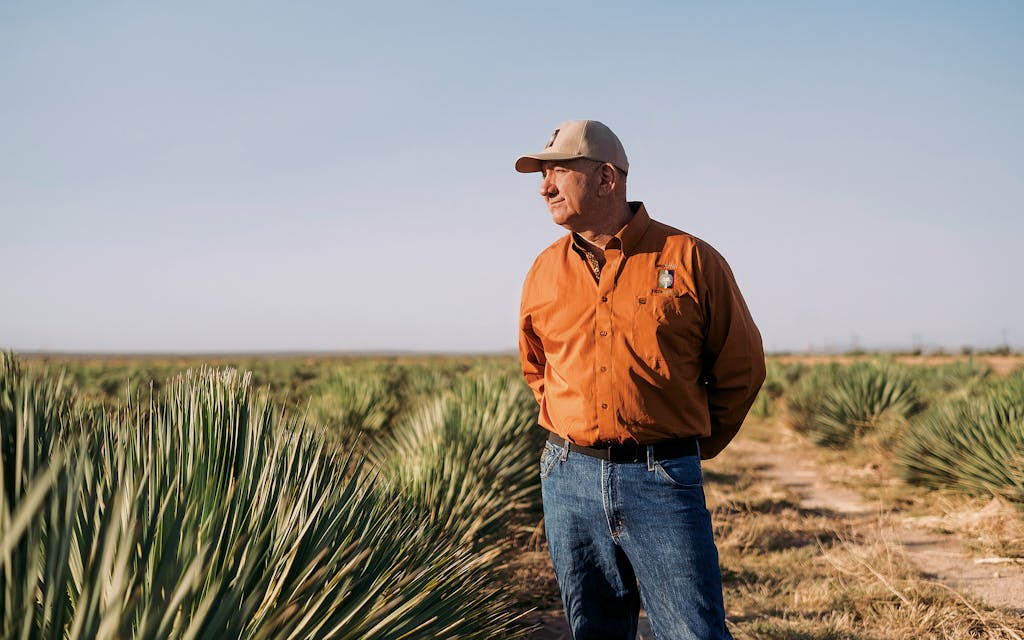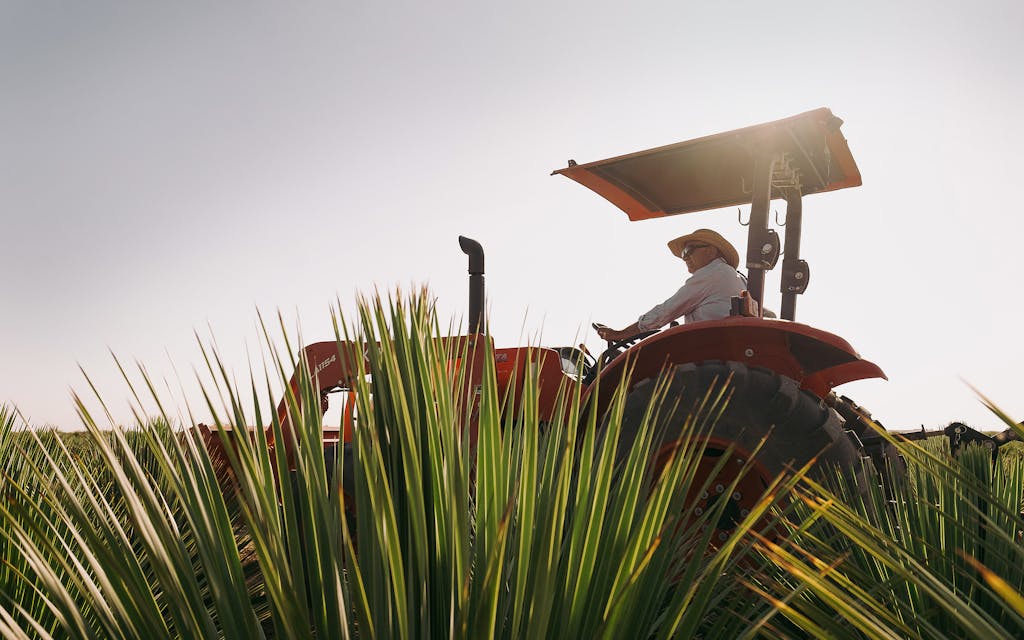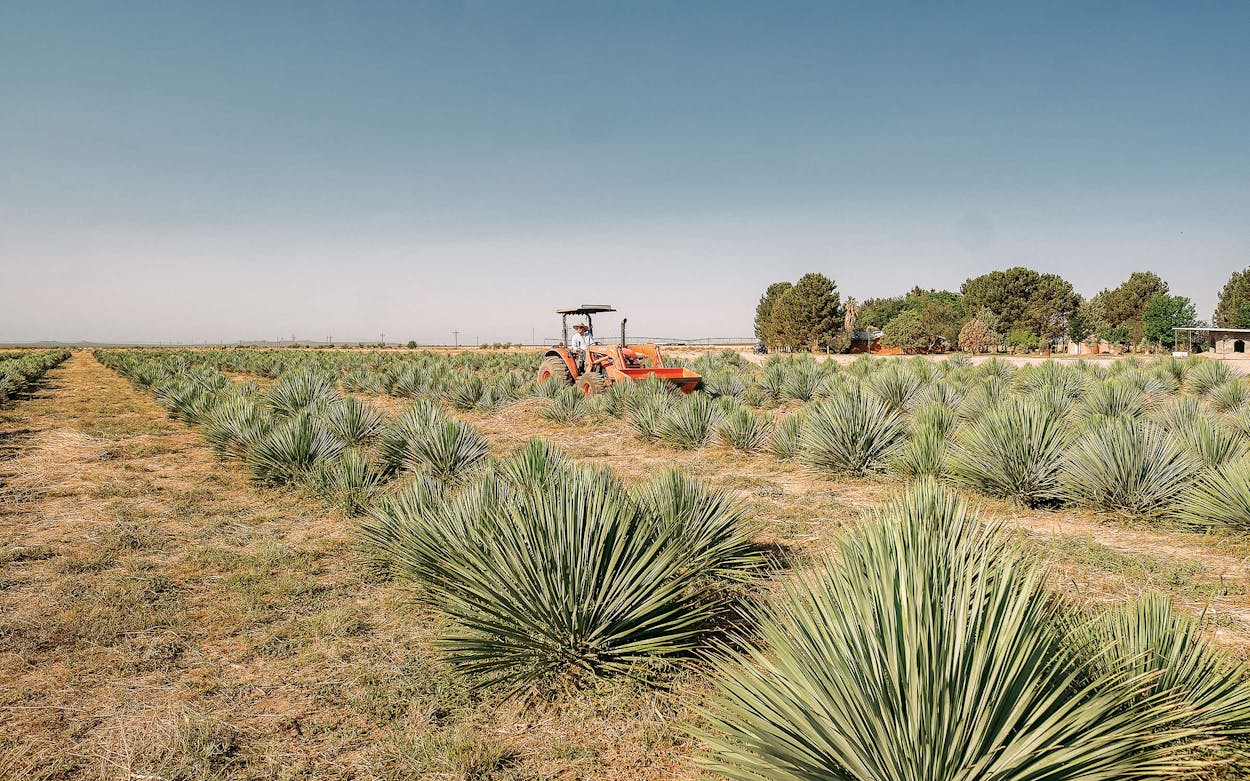Hoven Riley knew money was tight at his family’s West Texas cotton farm the year his mom asked him to go outside and dig up a yucca elata to use as a Christmas tree. The species, also known as the soaptree yucca, can grow as tall as twenty feet, and this particular plant was nearly impossible to unearth because it had a “taproot to China,” he recalls. But after a few hours of toil, Riley, who was 12 at the time, and his older brother dragged it inside and spray-painted the daggerlike leaves silver and gold for the holiday. “It was about as gaudy as you can get, but it was still beautiful,” says Riley, now 58. “I guess my passion for yucca goes back a long way.”
That sentiment didn’t always bind a young Riley to the dusty plot of land his parents owned just outside of Fort Stockton, in the Chihuahuan Desert. Growing up there, he couldn’t wait to get out. “I thought Texas was a wasteland,” he says. He left the state for college and moved around the country, but eventually the arid terrain of his childhood beckoned. In 2002 he took over the property and began turning it into a native plant farm specializing in three species of yucca and two of agave. These types of succulents are a tricky investment for farmers because they grow slowly, taking ten to fifteen years to reach the size most buyers want. Still, Riley says that once he got the idea, he never wavered.
His Big Bend Yucca Company has emerged as a “success story in the native plant world,” says Michael Eason, who heads the San Antonio Botanical Garden’s rare-plant conservation program. The scale—more than 20,000 yuccas alone—and quality of Riley’s crops are what first caught Eason’s attention. “We could use fifty more people like Hoven growing native plants for the market—ideally they would have started twenty years ago.”

Texas farmers need to cultivate more desert trees, Eason says, because the demand currently exceeds the supply. As more homeowners take up xeriscaping, or drought-tolerant landscaping, garden retailers have struggled to keep up. A burgeoning poaching trade has filled the gap with cacti and succulents stolen from parks and private lands. Buyers as far away as Europe and Asia can end up with yuccas, agaves, and ocotillos uprooted illegally from southern North America and shipped overseas.
Yucca is a genus of mostly hardy desert plants known for their sharp, pointed leaves; some varieties bear white, bell-shaped flowers. There are about thirteen species native to Texas. Shoppers can buy yuccas on Amazon, eBay, and Etsy, but few sellers reveal the origins of their plants. And yuccas can be very profitable for growers. I called one nursery in California that was selling a six-foot-tall, fourteen-year-old yucca rostrata for $2,500, only to learn that the price was a discount for buying more than one. A single plant cost $3,000.
The unethical trade has thrived in Texas because of our state’s lax laws. Arizona and California have much stricter regulations when it comes to uprooting native plants. In Texas, if you have permission from a landowner to dig up a bunch of wild yuccas or agaves, there are no penalties as long as the species is not threatened or endangered. But Eason thinks this can pose problems for the land. The Chihuahuan Desert is home to about a third of the 1,500 known cactus species on the planet, and irresponsible harvesting endangers wild populations and disrupts complex ecosystems. “There’s a legal trade of wild harvested plants, but is it ethical?” he says. “No—we deserve to treat the land better.” It’s illegal to remove plants for commercial purposes from public lands, such as state and national parks, but it’s not as if Homeland Security has guards on watch around the clock to bust yucca thieves. The West Texas game wardens I spoke with said the penalty for poaching off private lands without a permit can amount to little more than a trespassing citation, carrying a fine of about $500 to $1,000 (up to $2,000 in extreme cases).
Yuccas are especially vulnerable. Because they can take a decade or more to produce seedpods in the wild, uprooting them can also severely hinder regrowth. With Big Bend Yucca Company, Riley is proving that it’s possible to grow yuccas ethically, legally, and profitably, without harming the environment. “I’ve seen truckloads of desert plants leaving the state,” Riley says. “If you dig up one of these plants, it’s done. It’s not coming back. It breaks your heart a little bit.”


Riley’s yucca farm is a green oasis near the rock cliffs and mesas about fourteen miles west of Fort Stockton. “It’s the one with the trees,” he told me when giving directions to his property. The first thing a visitor notices is a massive yucca rostrata, also known as a type of Big Bend yucca, that stands more than twenty feet tall. Its thick, fibrous trunk is topped by a pom-pom of spiked, pale green leaves. This was the first yucca Riley planted, in the early eighties. He bought it in a one-gallon pot when he was in college in Arizona and brought it to Texas in his friend’s Chevy Nova, along with a bunch of prickly pear pads. They were stopped at a Border Patrol station just west of Van Horn, where guards searched the car, apparently looking for drugs.
“I had a beard and a head rag,” Riley says. “I was a prime suspect.” The guards took the hubcaps off, but left the plants alone.
Riley tells me all this as he gives me a tour of his 240-acre farm. He’s tall and laid-back, wearing a T-shirt and cap sporting the Big Bend Yucca Company logo. His grandfather’s rusty row maker sits near the driveway beneath some shade trees. Riley’s parents bought the land in the mid-seventies and built their “dream house” a few years later. He says they were “untethered from a conventional lifestyle and very apt at thinking out of the box.” That meant doing their best to get by as cotton farmers raising four children in an unforgiving landscape.
As a teenager, Riley knew for certain he wanted to do something different. “Cotton farmers are grumpy. It’s a tough life,” he says. The youngest sibling, he moved out of the house when he was about seventeen. He found a place in Fort Stockton and said that he was eighteen so he could get a job at a nearby oil field to raise money to attend college. He worked from midnight until eight in the morning, went straight to high school, worked at Sears for two hours in the afternoon, and then slept until it was time to head to the oil field again.
He yearned for greener, less arid landscapes and fantasized about being a mountain man. After attending college in Florida for almost two years and then transferring to the University of Arizona, where he took landscaping jobs, he worked for chapters of the Nature Conservancy, an environmental conservation nonprofit, in Arizona and in his home state. He eventually became a seasonal tour guide in Alaska’s Denali National Park, where he worked from 1997 to 2007, pointing out grizzlies, moose, and wolves to tourists. He also traveled around South America.
In 2001 Riley saw a flyer advertising yuccas for sale at an Arizona nursery. These were the same plants that grew wild around his childhood home, the same that he had used for a Christmas tree. “It was like a light bulb went off,” he says. “I just thought, maybe I can make a living at this. I saw other people digging them up to sell, and that just didn’t seem right to me.”

Not long after, Riley returned home for a visit. While sitting on the porch, he and his dad talked about the farm’s future. His father, who had stopped growing cotton years earlier, dared him to do something with the place, but also warned him that farming is a rough business. He told his son to assume that whatever he decided to grow, it would cost double and he’d make half of what he expected. Riley accepted the challenge. He planted his first crop in 2003, traveling to Alaska in the summer to make money guiding tours, then returning to the farm to care for his plants for the rest of the year. His venture was finally profitable enough for him to go into the yucca business full time in 2008, but it has taken extreme patience and dedication. “My parents taught us to think ten years ahead, not six months,” he says.
Riley and his wife, Maria Catalina, whom he met during a trip to Ecuador, now live in his old family home, a modest one-story house that feels like an adobe casita. His parents left Texas years ago to manage a ranch in Uruguay, where his mother still resides. Before his dad passed away in 2017, they were able to visit and see what he’d done with the farm. Riley says they were “pleased, proud, and amazed.”
A thick, intricately carved wooden door handpicked by his mom leads into Riley’s office. A rotund orange tabby named Silver, a.k.a. Gordo, lounges in the main room just off the kitchen. After a few minutes spent bonding with his cat, Riley leads me into a room that used to be a garage, and I remark on how pretty the terracotta floor is. “That’s concrete,” Riley corrects me. “My parents painted it to look like tiles.”
We enter a sunroom that peers onto the porch and out to the yucca fields beyond. A table of seed flats runs across the entire length of one wall. About 30,000 yuccas, in the form of tiny sprouts, are slowly growing inside this room, waiting to be planted outside in 2024. Riley checks the flats and sprays them with water several times a day. Growing yuccas is a long game, and he estimates that this batch will be ready to sell in 2030.
Motioning to the sprouts, which look more like alfalfa than the mighty yuccas they’ll become one day, he says, “This is not for easy money.”

As we step out into the yucca fields, I have to adjust my eyes. I’ve seen yuccas in my own yard and dotting the roadsides around Texas and California, but I’ve never tried to take in 20,000 at once. The blue-green leaves ripple in the wind, creating a sea of color and contour in an otherwise barren landscape. Riley calls it his “fifty-year plant,” meaning he’s trying to grow yuccas that might take fifty years to mature in nature in just ten years on the farm.
Riley now cultivates all of his yucca from seed cultures. He uses well water and says he can pump a thousand gallons a minute with the right motor. This is no high-tech yucca farm, though. Taking a page out of his parents’ book, Riley’s operation is DIY to its core. He doesn’t own million-dollar equipment like some “gentlemen farmers” in the region. The tools and equipment I see are well-worn. He made a shade house, which shields plants from excess heat and light, with old irrigation pipes, chains, and chicken wire.
As we wander through rows of yuccas, Riley tells me that his appreciation of this land has grown stronger during the COVID-19 pandemic. “When the whole world was falling apart, I’d be out here with my sprayer, listening to Marfa Public Radio.” His biggest threats are grasshoppers and other insects, as well as hail. The mule deer help with the weeds. He thought about growing tobacco as a natural insect repellent, but the time and effort it would have taken made him change his mind. “You’ve got to drop your idealism at some point,” he says.
Before the pandemic, he would haul his yuccas and some agaves to the Marfa Farm Stand every Saturday. Buyers lined up to wait for him. Barbara Hill, a Houston-based designer and “straight-up cactus lover” who has a house in Marfa, says Riley “knows how to raise them and do it right.” She bought a bunch of five-gallon buckets from him several years ago and says the yuccas and agaves are now “ginormous.” He hopes to get back to the Marfa stand soon, but for now he sells to nurseries, landscapers, and some wholesalers, as well as to individual shoppers through his online store, where yucca prices typically range from $150 to $600.
When Riley first set out to create a yucca farm in Fort Stockton, he says, friends thought he was nuts. “For the longest time I hid from people out here,” he says. “If this was in Marfa, I would probably be in the New York Times every month. But Pecos County is special too.”
That’s quite a statement coming from a guy who once thought Fort Stockton, and Texas in general, was a “wasteland.” Now Riley spends his days walking among the yuccas he’s grown from seed, caring for them and admiring their slow and steady bloom. “They speak to me,” he says. “They’re an iconic symbol of the West, just rugged and beautiful and strong, and that touches people. They’re a touchstone to so many emotions.”
Eventually we return to the house and stop once more to look back at his “fifty-year plants” swaying in the wind. He heads back inside to check his seedlings, the ones he’ll be tending to each day for the next eight years, until it’s time for another batch to take root.
Dina Gachman is a freelance writer in Austin. Her book So Sorry for Your Loss will be published by Union Square & Co. in 2023.
This article originally appeared in the July 2022 issue of Texas Monthly with the headline “The Yucca Whisperer.” Subscribe today.
- More About:
- Business
- Farmers
- Fort Stockton







